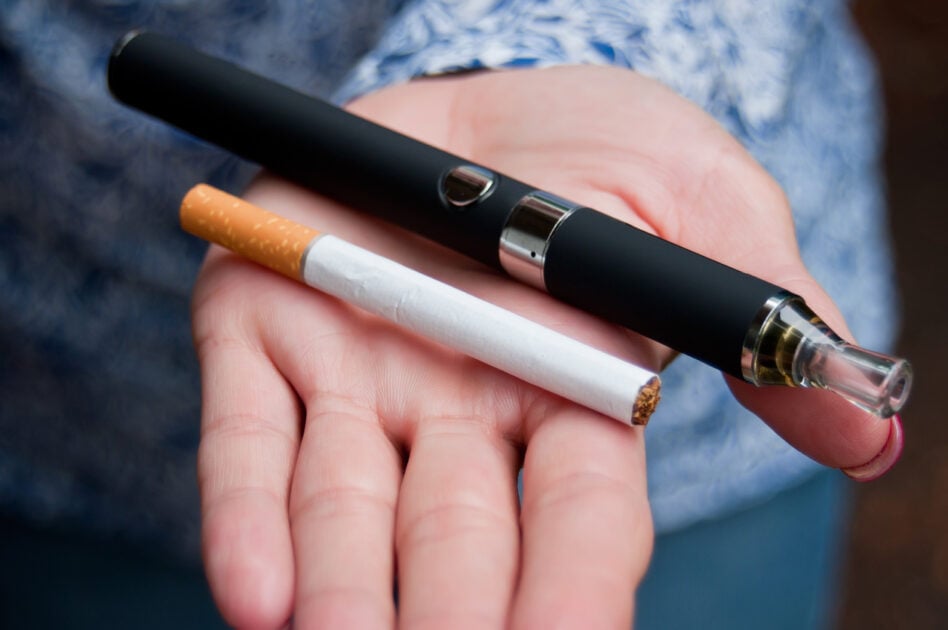Is vaping bad for me?
Vaping is an electronic version of smoking cigarettes but is it any healthier?

Vaping is an electronic version of smoking cigarettes, where vapour instead of smoke is inhaled from an e-cigarette. E-cigarettes do not contain tobacco or carbon monoxide, however they do contain nicotine and other chemicals that can be harmful and addictive.
E-cigarettes consist of a battery, a heating element or coil, and a cartridge which usually contains a solution of propylene glycol, water, flavouring and nicotine. When the user inhales, the battery heats the element and this produces the vapour.
The safety and health effects of e-cigarettes have not been thoroughly assessed or monitored over a long period of time. It is currently recommended that they should not be used .
Is vaping addictive?
The liquid in e-cigarettes contains nicotine which is a highly addictive chemical. When nicotine is inhaled into the lungs it is quickly released into the blood and up to the brain. Nicotine triggers the release of the chemical dopamine in the brain. Dopamine temporarily can help to regulate mood and behaviour. The brain quickly adapts to nicotine and, like most addictive substances, the brain needs more and more nicotine to produce the same effect. This is why nicotine is so addictive.
Can vaping help calm my anxiety?
Although nicotine may seem to make the user feel relaxed, once the nicotine levels begin to fall after about 20 minutes a person will experience withdrawal symptoms such as anxiety, feelings of stress and increased cravings. Continuing to vape will increase nicotine levels in the blood and ease these cravings, but makes the vapour dependent on using nicotine in order to relieve withdrawals. This creates a vicious cycle where you are vaping to relieve the anxiety caused by nicotine withdrawal in the first place.
Nicotine dependance can have negative health effects, especially on your mental health. Nicotine cravings disrupt sleep, alter your brain chemistry and mood, and can lead to patterns of addiction.
Read more about coping techniques to help lessen anxiety.
What effect does vaping have on my lungs?
Although vaping may not lead to lung cancer to the same extreme as cigarettes, it may lead to other lung diseases. Speak to your GP if you develop any respiratory symptoms such as cough, shortness of breath and fever. Avoid buying unregulated products on the black market.
In general, vaping makes our lungs more vulnerable to infection. There is a type of cell in our lungs called the alveolar macrophages or “dust cells”. These cells stop irritants such as dust and infectious bacteria from passing into our airways. They are also involved in lung inflammation which is a defence mechanism in the lungs to protect against infection.
Can vaping help me quit smoking?
Vaping is not recommended as a way to help quit smoking. Vaping can lead to increased nicotine addiction, and vaping instead of smoking does not help to break the relationship a person will have with smoking.
A person who chooses to vape instead of smoking will still repeat smoking behaviours as part of their lifestyle, they will maintain their addiction to nicotine and the routine in and of itself is an addictive factor involved in smoking.
What is the best way to quit smoking?
The recommended way to stop smoking is to use an evidenced-based medication such as nicotine replacement therapy or NRT. NRT can come in various forms such as patches, gum, lozenges, oral sprays and more.
There are also other stop smoking medications that can very effective; a doctor, nurse or other qualified practitioner can give you all the relevant information about these medications and prescribe them if they are suitable for you.
Vaping as a young person
Some people are choosing to vape instead of smoke, viewing it as a less harmful option. However, until long term research has been carried out, we will not know the true health effects of vaping. If a young person chooses to smoke tobacco or vape, they are still inhaling nicotine which is highly addictive. The younger a person tries nicotine the greater the negative effects can be. As a young person the brain is more vulnerable to the effects of addictive substances. Nicotine can disrupt brain development, interfere with long-term cognitive functioning, and increase the risk of various mental and physical health problems later in life. The safest option is to avoid smoking or vaping completely.
Help and advice to QUIT smoking
- Visit QUIT.ie for tips on quitting smoking and to sign up for an online quit plan
- Find QUIT on Facebook for tips and support from other quitters
- Call the Freephone Quitline to speak to someone who understands and can help you quit on Freephone 1800 201 203
- Talk to your GP or Pharmacist
- Read more about quitting smoking, the health effects of smoking and more on SpunOut.ie/QUIT
Disclaimer: There is more than one way to quit smoking. You may need to try a few different things to find what is right for you. For advice and support on quitting, visit SpunOut.ie/QUIT




